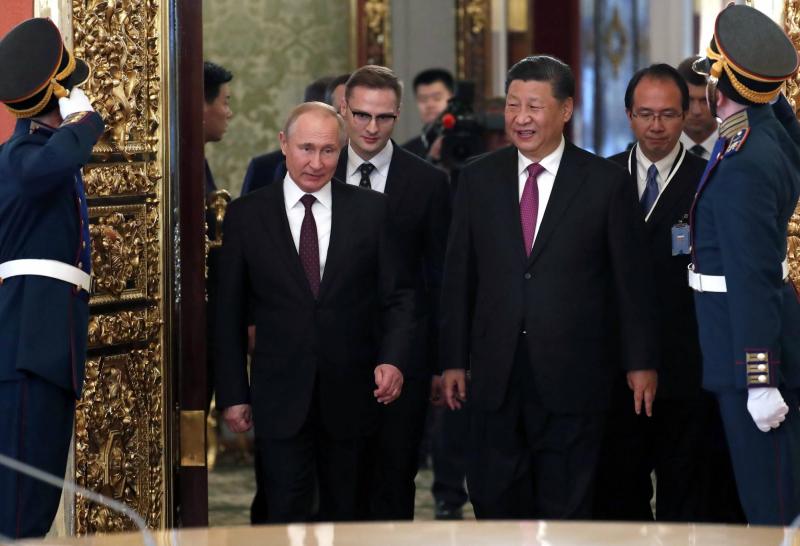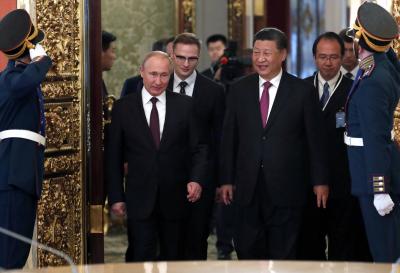Russian President Vladimir Putin and Chinese President Xi Jinping held extensive discussions in Moscow on Tuesday and signed two documents that form the basis for cooperation between their countries in various fields. Putin described the partnership with China as strategic and confirmed that Moscow is ready to secure all energy needs for the Chinese economy, including nuclear energy and natural gas.
Putin announced that Beijing and Moscow reached an agreement on the large-scale gas pipeline project "Power of Siberia 2," which will connect Siberia to northwest China. He stated at the Kremlin, "All agreements have been concluded," explaining that "once the project is operational, 50 billion cubic meters of gas" will flow through this pipeline, aimed at significantly increasing Russian deliveries to China.
He added that Russia is prepared to facilitate the operation of Chinese companies in Russia instead of the Western companies that have left the country. Putin also announced that talks with his Chinese counterpart resulted in the signing of two important documents that establish the foundation for cooperation between the two nations, adding that Russia will assist in building new nuclear power plants in China. He mentioned that Moscow aims to increase investment rates with China to about $200 billion during this year.
According to RIA Novosti, Putin and his Chinese counterpart signed documents regarding strategic cooperation. He was quoted stating, "My discussions with the Chinese president were successful and constructive," clearly indicating that China is now Russia's most important economic partner. TASS reported Putin mentioning that China is Russia's largest trading and economic partner.
Regarding the Chinese peace plan, Putin noted that discussions with Xi did not overlook the situation in Ukraine, adding, "The West is not yet ready for China's peace plan in Ukraine to be the basis for resolving the conflict." Putin highlighted that Chinese proposals can be used as a foundation for a peaceful settlement in Ukraine, but the West and Kyiv are not prepared for this yet.
In a joint statement issued at the end of Xi's state visit to Moscow, the two leaders warned against any steps that could push the Ukrainian conflict into an "uncontrollable phase," clearly stating that no party can emerge victorious in a nuclear war. Putin accused Western powers of fighting "to the end of Ukraine," while Xi reaffirmed "China's neutral stance" on Ukraine and called for dialogue.
Putin remarked, "We believe that many points of the peace plan proposed by China align with the Russian approach and could be considered a basis for a peaceful settlement when there is readiness for that in the West and Kyiv. However, I do not see such readiness from them yet." The 12-point Chinese proposal calls for de-escalation and, ultimately, a ceasefire in Ukraine, although it lacks details on how to end the war.
For its part, the United States rejected the proposal due to China's refusal to condemn Russia's invasion of Ukraine. It indicated that a ceasefire now would benefit Russia in the region and give Putin's army more time to regroup. Kyiv welcomes China's diplomatic role but insists that Russia must withdraw its forces from Ukraine and emphasizes the importance of Ukraine's territorial integrity.
In their joint statement, Xi and Putin called on the United States to stop "undermining global strategic security" and to cease developing a global missile defense system. Despite their commitment to conduct more regular joint military exercises, they stated that the strengthening of ties between their countries is not aimed at any third country and does not constitute a "military-political alliance."
For his part, Chinese President Xi Jinping confirmed that his country is working on updating and developing the objectives of full partnership with Russia by 2030. Xi informed Putin that he wants to "strengthen coordination" between Beijing and Moscow.
CCTV reported that Xi Jinping told Russian Prime Minister Mikhail Mishustin that the two countries should enhance the quality and volume of economic and trade cooperation. Xi emphasized that he signed an agreement with Russian President Vladimir Putin aimed at entering a "new era" of cooperation in their relations. He said in Putin's presence, "We signed a declaration on deepening the strategic partnership and bilateral relations entering a new era."
The Chinese president clarified that his country and Russia are building a multipolar world and strongly oppose any countries or coalitions that harm the interests of other states. He stated, "Our relations with Russia are important for the world and humanity," and affirmed that Beijing maintains a neutral stance on the crisis in Ukraine, calling for peace and dialogue.
Xi arrived in Moscow on Monday for an official visit, his first abroad since winning a third presidential term earlier this month in an unprecedented event.




